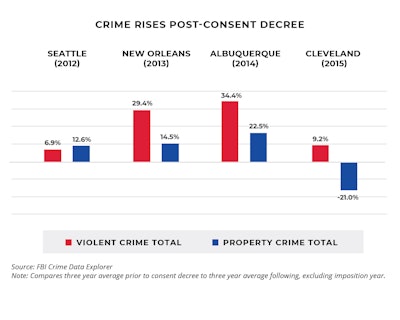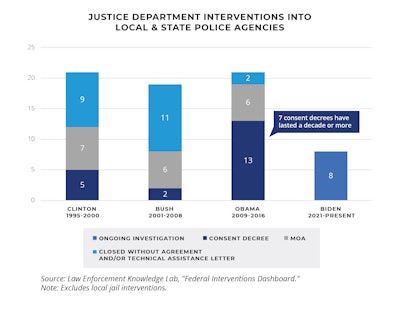 Law Enforcement Legal Defense Fund
Law Enforcement Legal Defense Fund
A new report, “Police Reform by Decree: How DOJ Enacts its Policing Agenda,” by the Law Enforcement Legal Defense Fund (LELDF) traces the development of local law enforcement interventions by the Department of Justice since the introduction of the “consent decree” process in 1994.
The report’s lead author and LELDF president, Jason Johnson, helped to lead the consent decree negotiations for the Baltimore Police Department as deputy commissioner of police (2016-2018).
LELDF’s report, which examines the nature and scope of these consent decrees over time, shows that federal consent decrees affecting law enforcement agencies can result in unintended consequences for the agencies, and their communities. The study includes original analysis of impacted cities’ crime and clearance rates as well as consent decree timelines and growth overtime.
 Law Enforcement Legal Defense Fund
Law Enforcement Legal Defense Fund
Federal interventions into local law enforcement agencies initiated under President Obama, and resumed by the Biden DOJ, have grown dramatically in scope and scale. It has often put its policy agenda for policing ahead of remedying specific constitutional violations with poor results. A more collaborative, targeted strategy built on narrow and achievable aims would be more effective, LELDF says.
The report concludes:
“When a consent decree is truly warranted, it must focus on the most urgent concerns. The violations should be clearly identified and fully supported by rigorous evidence. Remedies should reflect effective real-world reforms and remain inside the statutory framework. That requires setting realistic benchmarks, allocating sufficient funding, and holding police (and city) leadership accountable for enacting them effectively, efficiently, and in a timely manner.”
Key Findings:
- Consent decrees are the most onerous and costly of available federal police interventions;
- Recent DOJ investigations often rely on questionable evidence to prove a “pattern or practice” of unconstitutional policing;
- Cities and agencies agree to burdensome settlements under duress, with nearly every targeted jurisdiction accepting the Justice Department’s claims and remedies;
- These settlement agreements are used to impose policy preferences on law enforcement agencies, outside the scope of DOJ’s statutory authority and the law’s intent;
- Metrics, timetables, and outcomes for agency compliance are ill-defined, unachievable, and subject to the whims federal monitors and judges;
- Communities and departments under decrees suffer from rising crime and lower clearance rates, ballooning costs to local taxpayers, plummeting officer morale, and greater community dissatisfaction;
- Narrowly targeted, cooperative interventions including Technical Assistance (TA) letters and Memorandums of Agreement (MOA) are more effective alternatives;
- Where necessary, police consent decrees should be highly focused on remedying clear and urgent violations through proven and achievable strategies.










